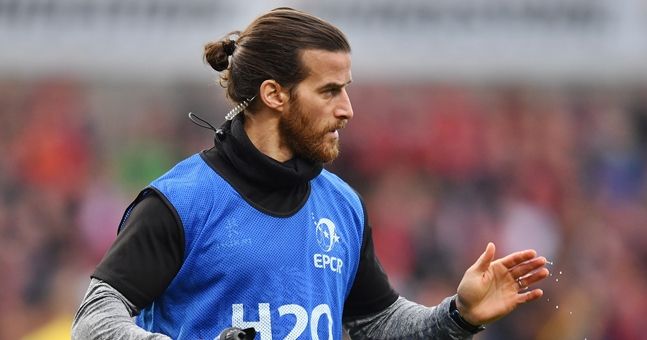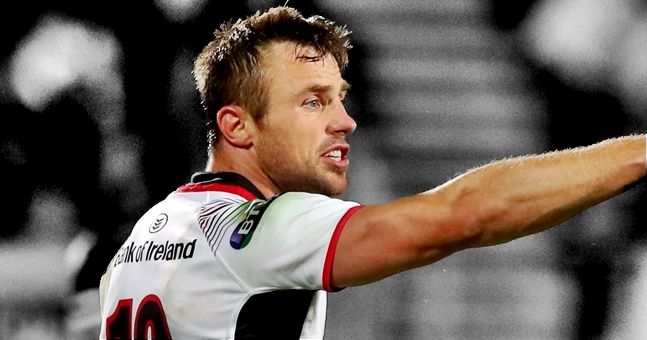

Share
12th October 2017
12:19pm BST

"The year Ulster won the European Cup [1999], I was named in the squad but I didn't play. Injury put a stop to that. That was the beginning of the end for me. "It was a short-lived professional career but, do you know what, if it wasn't for that I probably wouldn't be doing what I'm doing... I see myself as a failed professional rugby player and when I came back from that [injury], getting involved in high performance sport was my new goal."
 Davis travelled to Australia to gain S&C coaching experience at the Sydney Academy of Sport and, once he returned home, worked in the high performance field across various sports at Sport Institute Northern Ireland.
An opportunity arose with Ulster in 2006/07 and he jumped at the chance to return. There had been money put aside to build a national stadium - accommodating Gaelic, rugby and football - but when that plan hit the skids, it was freed up to transform Ravenhill into the modern stadium, with state-of-the-art facilities, that is currently known as Kingspan Stadium.
Davis came on board as part of those broad plans and immediately threw himself into the job. In his 11 years at Ulster Rugby, Davis has worked under seven head coaches and he considers himself extremely fortunate that most men in the top job have backed his use of technology and Global Positioning System [GPS] trackers.
"Better informed coaches and players make better decisions on the pitch," he says. "We're using information to empower and inform people so we can better understand the game."
It is only natural, then, having been at Ulster for so long that bonds form with the players. Asked what are his moments in the job that satisfy him the most, Davis says:
Davis travelled to Australia to gain S&C coaching experience at the Sydney Academy of Sport and, once he returned home, worked in the high performance field across various sports at Sport Institute Northern Ireland.
An opportunity arose with Ulster in 2006/07 and he jumped at the chance to return. There had been money put aside to build a national stadium - accommodating Gaelic, rugby and football - but when that plan hit the skids, it was freed up to transform Ravenhill into the modern stadium, with state-of-the-art facilities, that is currently known as Kingspan Stadium.
Davis came on board as part of those broad plans and immediately threw himself into the job. In his 11 years at Ulster Rugby, Davis has worked under seven head coaches and he considers himself extremely fortunate that most men in the top job have backed his use of technology and Global Positioning System [GPS] trackers.
"Better informed coaches and players make better decisions on the pitch," he says. "We're using information to empower and inform people so we can better understand the game."
It is only natural, then, having been at Ulster for so long that bonds form with the players. Asked what are his moments in the job that satisfy him the most, Davis says:
"Often small things, like a player coming back from a long-term injury - an ACL reconstruction, or something. Players being out for a year - you see those sort of traumas on the field. "I'm not going to say we're ever happy to lose a player to injury but if it happens on the field, that's part and parcel of the game and you've got to roll with it. We'll try to eradicate any other types of injury through smart training and knowing the players - training load tolerances and such. "For us, as a team, and for me, personally, the wins really matter in the league but it has been so long since we have won a trophy and that is something that would really matter."The singular goal is silverware and it is also the weight of expectation placed upon the shoulders of each member of the club - players, coaches and staff - until Ulster shake off the nearly men tag. "Performance is like a puzzle and we've got to solve that puzzle each week," he notes. "You've got a whole raft of things that can go wrong and do go wrong and you've to to problem-solve around it. I lose count of how many decisions that are made every day that will have ramifications or implications and, you hope, positive ones."
 Behind the stats and numbers, Davis is always conscious of the human element of the game. He takes in awe of the punishing work that the likes of Jared Payne and Rory Best put themselves through, talks eagerly about the lads that have crafted rugby careers despite not being blessed with natural gifts, and speak with genuine respect about how someone like Bowe can maintain his hunger for the game despite three serious injuries in four years.
"There are dark days and every player has been there at some point in time," he says.
Behind the stats and numbers, Davis is always conscious of the human element of the game. He takes in awe of the punishing work that the likes of Jared Payne and Rory Best put themselves through, talks eagerly about the lads that have crafted rugby careers despite not being blessed with natural gifts, and speak with genuine respect about how someone like Bowe can maintain his hunger for the game despite three serious injuries in four years.
"There are dark days and every player has been there at some point in time," he says.
"I think I'd be a pain in the ass for Tommy but you've got to be in that job that you do, in terms of what you need them to do and what they want to do. The game of rugby can be unforgiving; the players have to push and grind through that. "Everybody sacrifices for the greater good of the team and where we need to get the players so they can achieve. It's 24/7."The search for improvements, the extra 1%, never stops. Davis and his team will stretch themselves in every direction, seen and unseen, to get Ulster back to the top but central to that is the players. That can never be forgotten and, with Davis around, it never will be.
Explore more on these topics: